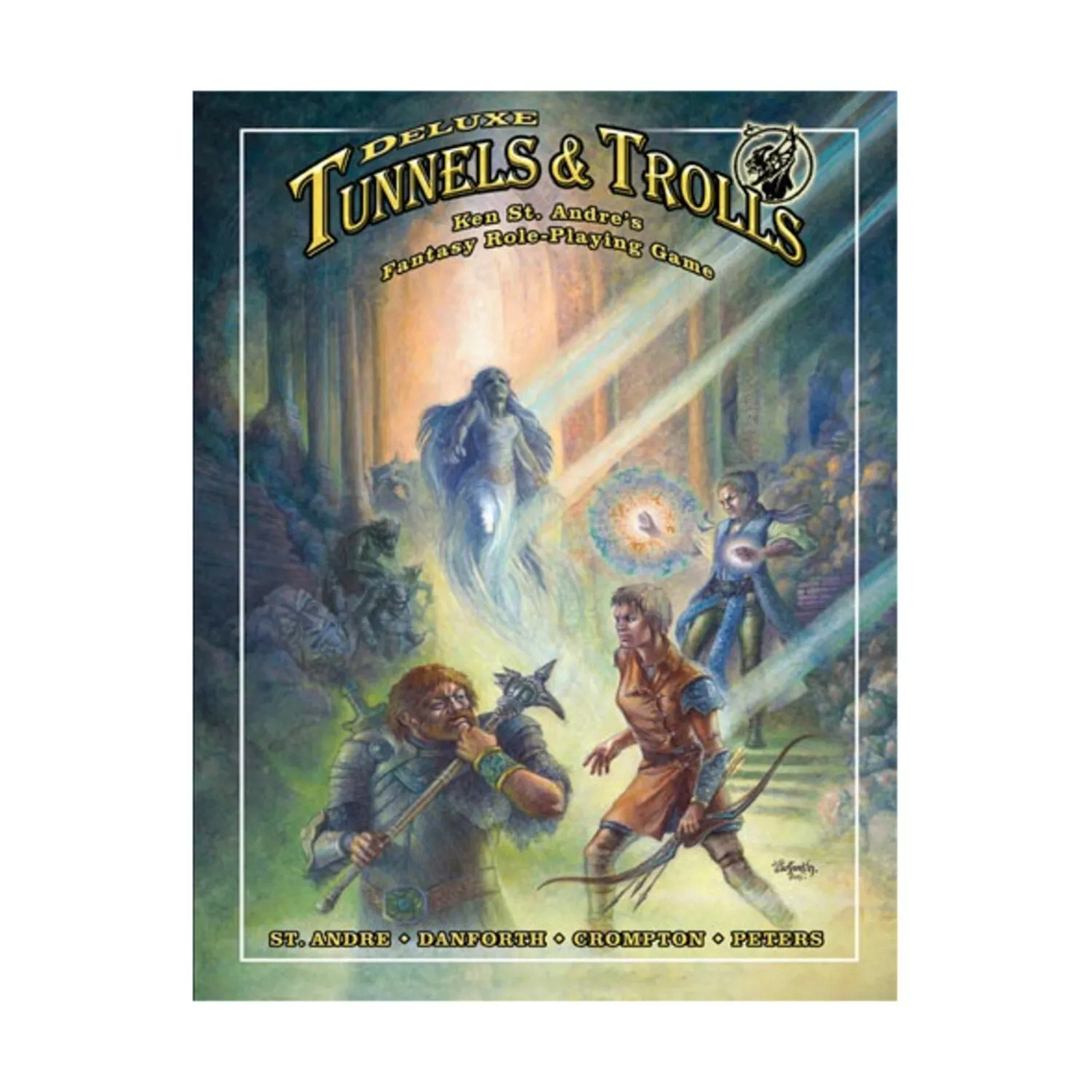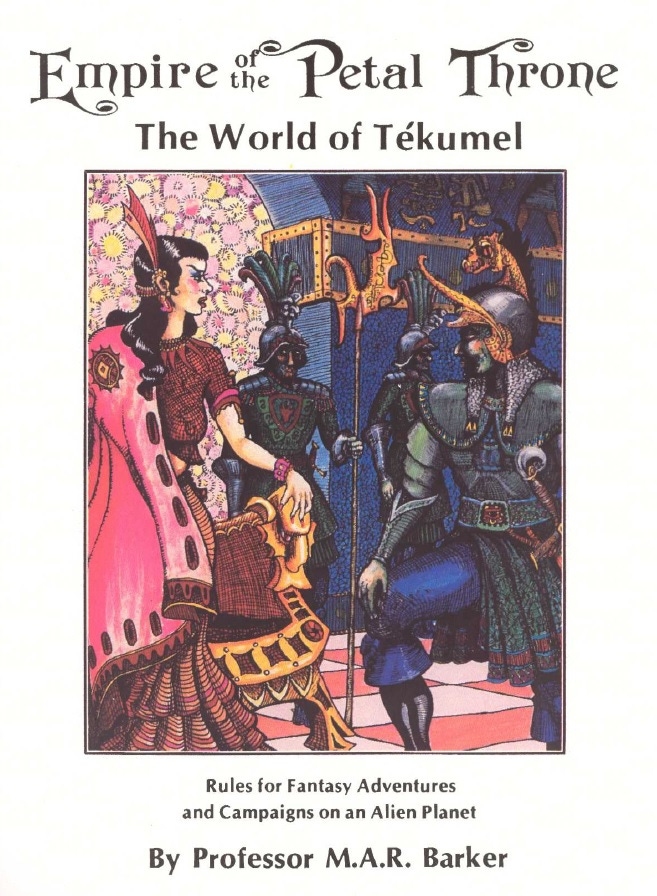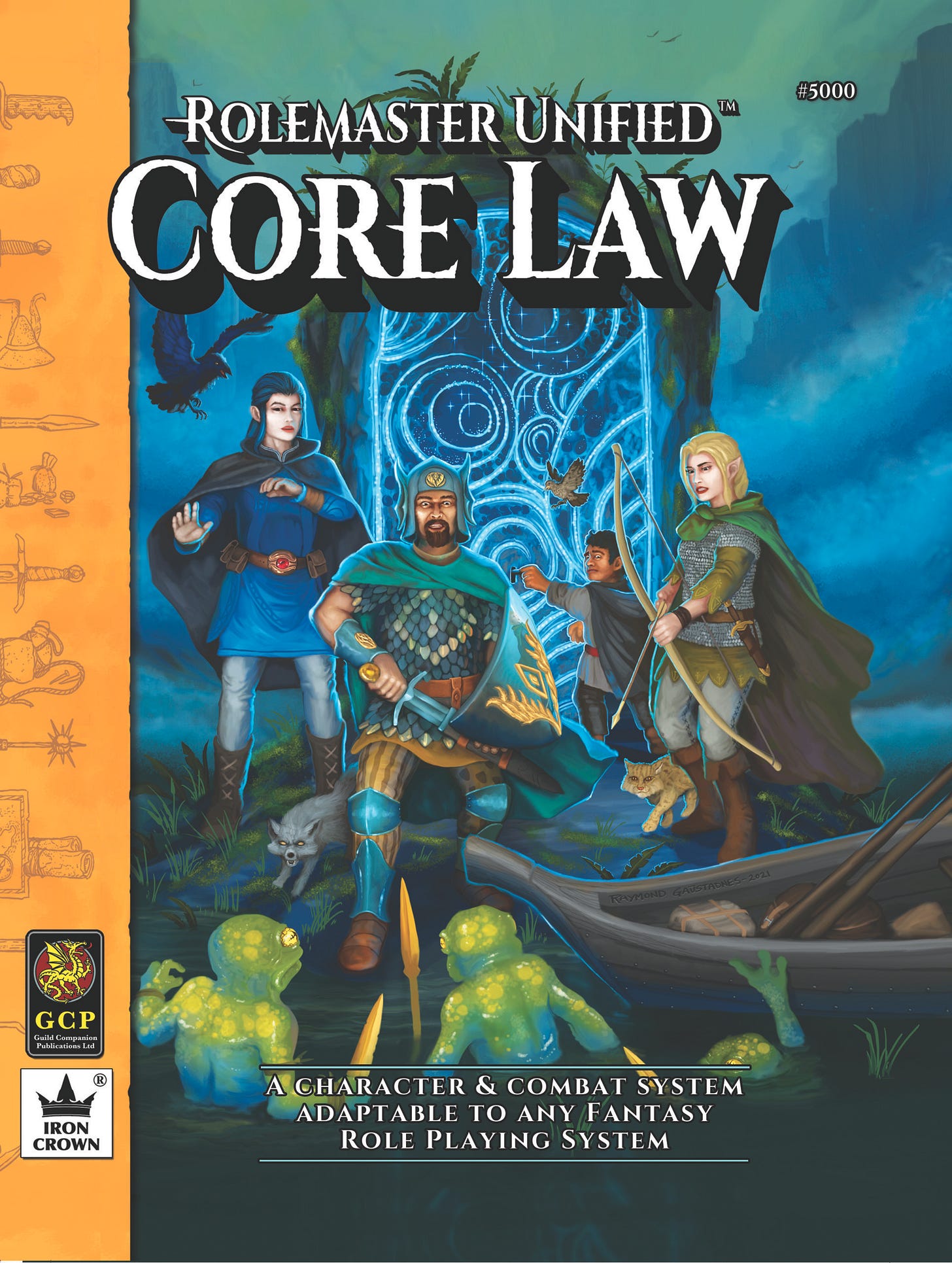With every piece of news about the upcoming fiftieth anniversary edition of Dungeons & Dragons a blog post or video of alternative fantasy roleplaying games appears. The most recent to cross my feeds is this video by the OG GM. While not a bad list I was disappointed that it was limited to games emulating a version of D&D to some degree.
I figured it was time to come up with my own list. Today I present three games to try if you're not interested in moving to D&D upcoming but want to move on from Fifth Edition along with an alternative runner up for each slot. My criteria for all three is they must be currently in available and have some degree of history indicating they have a lasting, if often small, place in the hobby. Each game and runner up are then selected for meeting an additional criteria.
Tunnels & Trolls
For my first choice I wanted something very simple, perhaps not even requiring special dice. The obvious choice is my go to convention game, Tunnels & Trolls. Depending on who you ask this is either the second or third commercially published RPG. For years I considered it second and probably still do but in the past few months I learned of a game published between it and D&D1.
T&T uses only six sided dice. Combat is group based which at its simplest is "everyone rolls damage and the lower rolling side takes the difference". Spells are cast using the points of stat, strength up through fifth edition and 5.5, 7/7.5, and Deluxe using a mana stat. All other actions use saving rolls. Saving rolls are a stat plus an roll of two 2d6 against a target with doubles other than double ones reroll and add.
It is a class and level system. In its traditional 3d6 character generation triples do the same and in Deluxe open specialized character classes. One superclass with the powers of warriors and wizards requires all above average roles while a weakened mix, the rogue, can be chosen normally. Experience is awarded for killing things and the number rolled on saving rolls, failed or succeeded. Experience is spent to improve stats and a character's level is the multiple of ten closest to one of three stat's value. Which three depends on your character's class.
One thing which I think held back T&T was it’s presentation was often a bit silly. With spells like “Poor Baby” for healing and “Take That You Fiend” as the basic attack spell it wasn’t hard to wind up in slapstick land. This isn’t wholly bad. As I said, this makes a great convention game or filler. I remember a group of two humans and two fairies, the latter of whole ran out of money so used her rope as clothing, dropping through a trap door into an orc poker game. Hillary ensued. The problem is after experiences like this it is hard to sell a long term campaign with the same rules.
The current edition is Deluxe Tunnels & Trolls by Ken St. Andre and edited by Liz Danforth, who also did a good deal of the art. This is the same team that gave us the fifth edition and is in my opinion the pinnacle of the game. There is also a free, cut down rulebook.
Alternative: Monsters! Monsters!
Since the release of Deluxe Tunnels & Trolls the game has been sold. Ken has focused more on Monsters! Monsters! whose origin was essentially a reversed T&T or D&D where the monsters go hunting heroes, raiding towns, and so on. I know Ken's ideas on character development have changed. The only reason T&T is the recommendation and M!M! is the alternate is relatively poor support for human characters. Recently a supplement, Humans! Humans!, was crowdfunded to change this (previously Ken hinted in the 2.7 intro that 3.0 would have these rules). Once they are released my recommendation would flip.
Empire of the Petal Throne
Empire of the Petal Throne is the first roleplaying game published with a setting provide. That setting has remained one of the richest and most unique settings in the hobby. Dr. M. A. R. Barker first started to imagine the world of Tékumel in his youth. While I don't have an exact age in all probability he started doing the Great Depression.
Tékumel is a world settled by a human space empire sixty millennia in the future. Then "something bad happened" and it was translated to a pocket universe. The transition resulted in earthquakes, climate disasters, a rising of restless natives humans had confined to reservations, and a loss of access to technology and even metals as Tékumel is a metal poor world. It is now several millennia after the disaster and the northern continent is dominated by five human empires, which is where you begin play. You are barbarians from the south coming to the Tsolyáni Empire seeking fortune but with no knowledge of the Empire and in need of patrons and guides.
In terms of rules, EPT is a cleaned up original D&D that uses percentile dice instead of a d20. While I said I was writing this list to avoid D&D derivatives the alternate directions Dr. Barker took have to my knowledge not been repeated so I see this as less D20 and more road not taken. Besides, the star of this game isn't the rules but the world. The human empire that first settled it was built on a culture derived from Chinese, Indian, Middle Eastern, and South American nations after a nuclear war destroyed the US, Europe, and the Soviet Union. As a professor of languages Dr. Barker even gave us complete languages.
Tékumel is still one of the furthest fantasy settings from generic "medieval" Europe in game. To quote Dr. Barker in the rules:
At first glance it may appear very difficult to master all of the background material relating to Tékumel. The people, the flora, the fauna, the societies — all are new, and all are complex…In defense, the author can only say that he ENJOYS societies which are not simply reruns of the usual Graeco-Roman or Mediaeval fantasy mythos, but which present something really different: something akin to stepping off an airplane in Bhutan or Medina, rather than in familiar old London or Paris.
The problem with EPT is sadly Dr. Barker himself. A few years ago it came out he published a Neo-Nazi novel under a pseudonym in 1991 and was on the advisory board of a history journal that promoted Holocaust denial for over a decade starting about the same time.2 There is a division in the fanbase over it. Some people, such as the host of the Jarjanix blog, have stopped playing. At the opposite end of the spectrum Jeff Dee and Jeff Grubb advocate taking the world away from the Professor.
Alternative: RuneQuest: Roleplaying in Glorantha*
So, if playing something written by a man who at best had Nazi sympathies and is accused of white supremacy the best unique world is Glorantha. I have personally been a Glorantha fan longer than a Tékumel fan. I got *RuneQuest's* second edition in the seventh grade but didn't get any Tékumel game (there have been four official ones after EPT) until this century.
Glorantha is a world build around mythology and various theories on what it means and how magic works. It is bronze age influenced and everyone has some degree of magic. In it instead of Paris or London you’ll wind up in Troy or Biblical Jericho. The system is that which later powered *Call of Cthulhu* and other Chaosium games.
I chose EPT over it despite the Dr. Barker's history for three reasons. I think it is more expensive to get into. EPT has more than enough to Tékumel for years of adventures. A print copy of it and its maps will run $32 while pdfs are just under $11. The corebook for the current edition of RQ is $55 in print and $28 in pdf and provides less material for a long term campaign. Second, EPT is just a touch more important in the history of the hobby. Finally, the default adventure setup of EPT allows not just the players but the gamemaster to learn the alien culture of the world as they play. This is harder to do for the gamemaster with Glorantha.
Rolemaster
Do you like rules with lots of complex options? Do you like strong character customization? Do you like planning levels of character advancement ahead of time? Do you think D&D 3.x and Pathfinder do okay on these areas but want more?
Then you want Rolemaster. RM began as a series of boxed systems, Arms Law for weapons combat, Spell Law for magic, and Claw Law for animals, monsters, and martial arts fighting, that could be used with other RPGs (which circa 1980 really meant with D&D/AD&D). With the fourth box, Character Law, it became a complete game in its own right.
Characters get points that you spend on everything: spells, weapons, hit points, armor wearing, other skills, but the costs aren't uniform. Your class determines what things cost and how many you can buy per level. The typical character has 25 points per level to spend. Fighters can buy one level for most weapons with 1 or 2 points and a second for 5 or 7 points at least level of advancement. Most magic using classes can buy 5% cumulative chances to learn the next 10 spells of spell list (yes, chances and list) in unlimited number until they run out of points for 1 points per 5% chance. A magic user spends 20 points and just gets 10 levels of spells from the list. A fighter will spend 20 points for a 5% chance while the magic user will pay 20 to get one level with sword.
Oh, and you get two rounds of this in character creation and then plan what you'll get at level 2.
Combat produces criticals and fumbles with legendary results including tripping over invisible turtles and stabbing yourself.
Plus, with the original RM there are seven numbered and four unnumbered companions adding new classes, spells, skills, and options.
I played this as a junior in high school. While the guy who hosted us owned an Apple II most of us did not have a computer. Like the contemporary Champions my interest was high but playing was tempered by having to do a lot of calculations by hand with all the risk of era. Champions was more complex but you had to do the RM math twice during character creation then every level.
Alternative: Against the Darkmaster
For those who thought Rolemaster is a bit much there have been simpler versions. In the 90s Iron Crown Enterprises released HARP which stands for High Adventure Roleplaying. Before that, in the 80s, when they had the license to produce Middle Earth roleplaying materials they used a cutdown RM known as or MERP. With the end of Middle Earth Role Playing the license MERP ended.
In the past few years a cleaned up clone of MERP came out, Against the Darkmaster. The theme of the game, fighting a dark lord, is pretty obvious. One interesting addition is rules for developing the kind of dark lord and what that means in terms of world building. Beyond that, it implements the basic character design per level system in a much simpler and cleaner way.
So there are my three suggestions if you'd like to try something instead of following Wizards into One D&D or whatever it is finally called. All have been around for nearly as long as D&D but gone in very different directions.
The contender is Rules for the Game of Dungeon which the RPG historian Jon Peterson covered. I am iffy on considering it the second given its short print run and lack of follow-up.
Some context to explain this is the fact that M. A. R. stand for Muhammad Abd-al-Rahman. Phillip Barker converted to Islam in the 50s after being introduced to it while visiting India. While disappointed to learn Dr. Barker had done these things I wasn’t surprise. I also read these are more antisemitic than white supremacist (to the degree that makes a different). I can’t see white supremacists becoming professors of Urdo or writing the paragraph quoted above.






